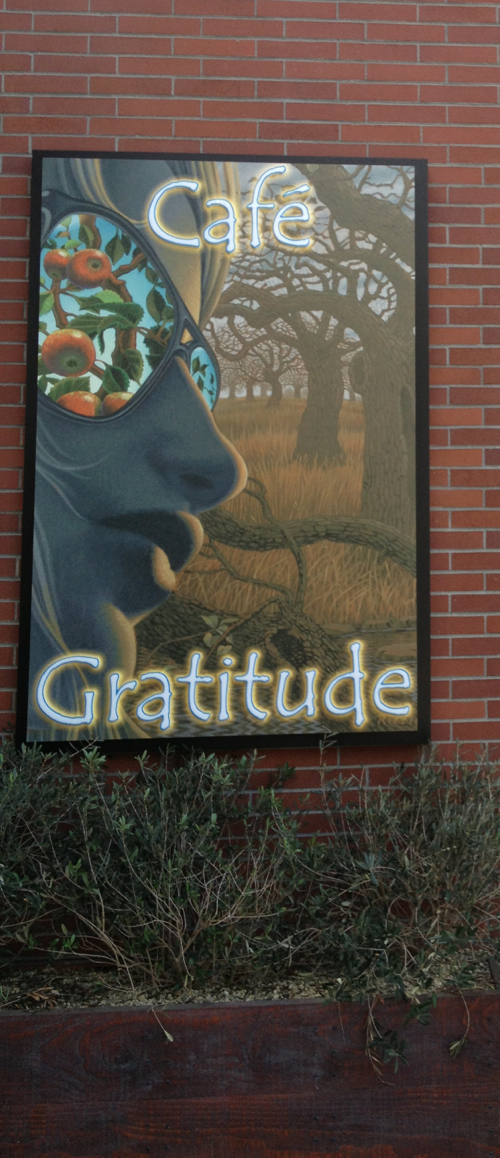The art of happiness: how to remain humane, not robotised
We can reflect better on recent happenings in the moments not in the midst of the fuss of life. This is why I am writing about happiness, giving and receiving now, just after Christmas. Before another year in the deceivingly long span of our life takes off, we tend to contemplate our failures, sucesses and relationships more than at any other time of the year. For most of us such introspection lures in a depressive mood in the place of an elevated state of mind. Let’s fix it now.

Keep the emotions real: dying, giving and receiving
First remeber – we are humans, and we all die once, so feel, discuss, but do not worry about this year’s malign spread of sad news. David Bowie, now George Michael, you may think, yes grand talents’ deaths sadden, but they gave us so much beauty through their touching, hard work, and to honour their humaness we must receive it with gratitude. To preserve our happiness and humanness from an exposure to an impending risk of succumbing to lower species, we must keep our emotions real, think and make decisions based on our cognitive capabilities and not outsource these well evolved human tasks to computerized algorithms and emoticons. Technology can soon outsmart us in evolution, and natural selection perhaps can reshuffle the most recent hierarchy of species to the superiority of manmade creations.
We can prevent such a dystopian catastrophe if we are mindful of how we use our emotions, how their positive or negative charge affects others and do as much as our will allows for to be diplomatic, empathetic, as well as uphold the right ethical values. We must also teach humanity with all its ups and downs to the future generations. This should make us happy.


Giving happiness
During the highly emotionally charged events like Christmas such mission floats up to the surface of our daily existence. We are tickled by goodness and also by emotions towards our dearest ones.
Take the art of giving and receiving gifts. This emotional act is organically tied together with our intention to be good to others, to shine as a great person in other people’s minds. Yet, ethically, it is not acceptable to expect something in return for the goodness, and we should not retreat into sadness when someone to whom we gave a present did not return our generosity. It is human though to preserve and think about the self, and it is honourable to make others feel good. Therefore, teach anyone dear to you to sincerely and fearlessly express your intentions and show care, love.


Expectations affect happiness
Each of us has a different expectations from giving. Some desire that status affirming watch, a pet, or another material indulgence, while others appreciate more the effort behind the gift such as when you bake something special, paint, sculpt a vase or made anything with your own hands to bring joy to the other’s life. Wrapping your gift for others yourself and trying to do it originally can have a more profound impact than the content inside the box.
When you opened your latest Christmas gifts what do you remember most about it? How you felt or what was inside?
Cicero contemplated the essentials of a happy life in his Discussions at Tusculum. He dedicated the fifth book to the philosophy On the Good Life, where he argues that moral goodness is in itself sufficient for a happy life. For some individuals, and philosophers of the stoic school in particular, trying to be as good as one can may indeed bring about a real sense of happiness. What seems more poignant though is his observation on a man’s lust, as Cicero writes: “a man driven to a mad frenzy by lust, so that he plunges himself instaiably into every sort of sensuality, and still, the deeeper the draughts he takes from every source, the more furious and rabid his thirst becomes: there, obviously is another thoroughly unhappy man.”
For your own best, receive the intention from others to make you happy and not the material present itself. Later in life, you may realise how much more generous the positive emotional exchange was than anything that wears off, breaks down, spoils, or in other way decays. We imprint emotions into our mind, and they can help us to keep going ahead and to live a happy, fulfilled life.

More than three decades of diverse experience in my life allows me for a broad enough point of view on giving and receiving. Here is my insight into the distinct attitudes to giving and receiving gifts from others. As a child I had extraterrestrial expectations about gifts, in particular these attached to Christmas. Later as a teenager, living near and far from those I cherished and loved, I started to long for positive human emotions more than anything material. Care felt soothing. Even now, a postcard or a surprise visit from friends could make me happier than anything wrapped in a pretty tissue and tied by a fancy ribbon. When I visited Mexico for the first time, a friend arranged a bottle of tequila and local snack of crunchy crickets in our hotel room. Accompanied by an explanatory card, where she described bug eating as typical in her country, we snacked and sipped happily despite our initial horror. Her effort was appreciated as we learned and tasted the real Mexico.

Gifts not expected
Spontaneous giving is more rare, but doesn’t it actually make you more happy? The joy from the unexpected is a powerful psychological phenomenon. A bunch of flowers from a partner or a friend received not on a Valentine’s day or another for gift-calling anniversary, is more impactful than the compulsory bouquet with a box of chocolates on the dates specified by some authority, often with the shameful aim of commercial exploitation.
Gifting is also a social construct. Once we came with the wonderful, mood uplifting invention of celebrating anniversaries, birthdays, Christmas, bar mitzvah, weddings, and other culturally established days of giving.
Sadly, the spirit of Christmas has been largely lost to the highly commercialised material pursuits, and the stress preceding these holidays counters the balming effect that Christmas should caress us with.
A person’s wealth can leap any present from necessity to desire. Families that have so little that survival is their daily bread tend to afford something very basic, for which they had saved for a long time to comfort their harsh lifestyle. Middle class families are the biggest targets of advertisers and also end up being the most affected victims of buying many things that they do not need. For the sake of the occasion they force themselves to buy just something. What for are all these presents that were never used, set aside into the dark cave or a storage room? Waste, sure, and a shame. What can we learn from this though?
In our society, the symbol that any gift embodies is more important and surely should be more profoundly appreciated. Also, an advice can be worth more than any physical gift.


The evil spirit of technology: giving up privacy and hapiness
So far most of us decide what we give, but not in that distant future an app will surely emerge [if it does not exist yet], scanning the online world of the virtual social media with the profiles of your relatives and friends. Algoritms may recommend gifts, bought online with appropriate sponsored links, of course. Shall we just skip the entire process of giving? The soon to be superior species of technology can decide for us, no need for brains, emotions, considerations and effort at all. Wasn’t the initial purpose of giving happiness?
Still, we cannot read human minds, but technology is slowly with a sly determination getting inside our heads. No need for any controversial bugs operated into the human brain as you are giving part of yourself out there into the cloud of the internet. All with your consent to make it all legal. Cookies are there to tempt you, thus their name! These tasteless cookies collect information about your online behaviour and this is being stored not just to your advantage, but mainly to more precisely seduce your giving (clicking) hand into buying what you disclosed through your clicks.
Human intention to be good vs technology
It is not inherent in the intention to be good to be told by the robotic technology what to give others. Emotions posses a dual character – good and the bad. The feelings that help, while others that harm, so we must be vigilant, but we above all have a choice. Do we all (the internet money makers inclusive) really want to be good? The devil sticks his wicked nagging into our minds, tempting to evil actions. Psychology teaches that any person, however good he might have seem has an aptitude for behaving badly. And what drives us to such behaviour? Philip Zimbardo in his best-selling psychology book The Lucifer Effect proves that depending on the circumstances, our environment and the people surrounding us, we can shift our value ladder. Also known as the broken windows theory this is the strongest support of the social psychology. Thus a large question mark remains; who wins this good vs bad battle when technology drives our lives? Whispering into our comforted ears what to do, technology’s brain may lead to a human decay. Using the decision process strengthens us, and if we give it up, blindly, step by step, we may loose an important component of our intelligence.
The new addiction and the fourth estate: technology driving your life
Addictions are harmful and rarely yield happiness.
Today, more traps of marketing are readied for us to fall into. The exchange rate is not fair since our work, social status as well as our private relations now depend on the virtual connectedness. The choice was like a honeycomb irresistible, in fact at this point there is no choice. We would risk too much to disconnect totally. The loss in the game of speed may seem irreversible, while patience is not rewarded any more in the second millennium.
Still, making the choice and deciding is what makes us human next to other things, but technology is less about choice but being pushed into a certain direction. The information is sifted through our previous clicks, but this increased discrimination of choices is bad for us. How can we trust the IT power behind the the websites that now direct and inform our lives? Can less transparent information and less effort make us happy?
Look at art, the celebrated act of human creativity and hard work that changed termendously because of technology. Much of contemporary art is a muzzle of abstractions, but the skill, the honed craft of depicting something around us is now less appreciated. A friend artist recently told me that in the present time when any compact camera can freeze a moment we do not need to paint reality. True, yet it seems that contemporary art is much more vulnerable to speculation, manipulation and misvaluation, as the talent, the materialisation of human skill is overlooked. Where is the elaborate composition, the careful decisionmaking when pressing the shutter? No need to think almost at all now, thank you technology, and I hope this do it for me will make us happier.

